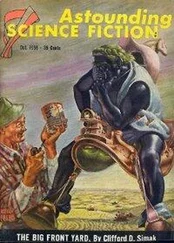When he had gone, Warren buzzed the engine room communicator.
Mac’s voice came reedily out of the box.
“Having any luck, Mac?”
“None at all,” Mac told him. “We sit and look at the engines. We are going out of our heads trying to remember.”
“I guess that’s all you can do, Mac.”
“We could mess around with them, but I’m afraid if we do, we’ll get something out of kilter.”
“Keep your hands off everything,” commanded Warren in sudden alarm. “Don’t touch a single thing. God knows what you might do.”
“We’re just sitting,” Mac said, “and looking at the engines and trying to remember.”
Crazy, thought Warren.
Of course it was crazy.
Down there were men trained to operate spaceship engines, men who had lived and slept with engines for year on lonesome year. And now they sat and looked at engines and wondered how to run them.
Warren got up from his desk and went slowly down the stairs.
In the cook’s quarters, he found Bat Ears.
Bat Ears had fallen off a chair and was fast asleep upon the floor, breathing heavily. The room reeked with liquor fumes. An almost empty bottle sat upon the table.
Warren reached out a foot and prodded Bat Ears gently. Bat Ears moaned a little in his sleep.
Warren picked up the bottle and held it to the light. There was one good, long drink.
He tilted the bottle and took the drink, then hurled the empty bottle against the wall. The broken plastiglass sprayed in a shower down on Bat Ears’ head.
Bat Ears raised a hand and brushed it off, as if brushing away a fly. Then he slept on, smiling, with his mind comfortably drugged against memories he no longer had.
XII
They covered the tower with the capstone once again and rigged a tripod and pulley above it. then they took the capstone off and used the pulley to lower an automatic camera into the pit and they got their pictures.
There was something in the tower, all right.
They spread the pictures out on the table in the mess room and tried to make out what they had.
It was shaped like a watermelon or an egg stood on one end with the lower end slightly mashed so that it would stand upright. It sprouted tiny hairs all over and some of the hairs were blurred in the pictures, as if they might have been vibrating. There was tubing and what seemed to be wiring, even if it didn’t look exactly the way you thought of wiring, massed around the lower end of the egg.
They made other tests, lowering the instruments with the pulley, and they determined that the egg was alive and that it was the equivalent of a warm-blooded animal, although they were fairly sure that its fluids would not be identical with blood.
It was soft and unprotected by any covering shell and it pulsed and gave out some sort of vibrations. They couldn’t determine what sort of vibrations. The little hairs that covered it were continually in motion.
They put the capstone back in place again, but left the tripod and the pulley standing.
Howard, the biologist, said, “It’s alive and it’s an organism of some kind, but I’m not at all convinced that it’s pure animal. Those wires and that piping lead straight into it, as if, you’d almost swear, the piping and the wires were a part of it. And look at these – what would you call them? – these studs, almost like connections for other wires.”
“It’s not conceivable,” said Spencer, “that an animal and a mechanism should be joined together. Take Man and his machines. Man and the machines work together, but Man maintains his individual identity and the machines maintain their own. In a lot of cases it would make more sense, economically, if not socially, that Man and machine should be one, that the two of them be joined together, become, in fact, one organism.”
Dyer said, “I think that may be what we have here.”
“Those other towers?” asked Ellis.
“They could be connected,” Spencer suggested, “associated in some way. All eight of them could be, as a matter of principle, one complex organism.”
“We don’t know what’s in those other towers,” said Ellis.
“We could find out,” Howard answered.
“No, we can’t,” objected Spencer. “We don’t dare. We’ve fooled around with them more than was safe. Mac and his crew went for a walk and found the towers and examined them, just casually, you understand, and they came back not knowing how to operate the engines. We can’t take the chance of fooling around with them a minute longer than is necessary. Already we may have lost more than we suspect.”
“You mean,” said Clyne, “that the loss of memory we may have experienced will show up later? That we may not know now we’ve lost it, but will find later that we did?”
Spencer nodded. “That’s what happened to Mac. He or any member of his crew would have sworn, up to the minute that they tried to start the engines, that they could start them. They took it for granted, just as we take our knowledge for granted. Until we come to use the specific knowledge we have lost, we won’t realize we’ve lost it.”
“It scares you just to think about it,” Howard said.
Lang said, “It’s some sort of communications system.”
“Naturally you’d think so. You’re a communications man.”
“Those wires.”
“And what about the pipes?” asked Howard.
“I have a theory on that one,” Spencer told them. “The pipes supply the food.”
“Attached to some food supply,” said Clyne. “A tank of food buried in the ground.”
“More likely roots,” Howard put in. “To talk of tanks of food would mean these are transplanted things. They could just as easily be native to this planet.”
“They couldn’t have built those towers,” said Ellis. “If they were native, they’d have had to build those towers themselves. Something or someone else built the towers, like a farmer builds a barn to protect his cattle. I’d vote for tanks of food.”
Warren spoke for the first time. “What makes you think it’s a communications set up?”
Lang shrugged. “Nothing specific. Those wires, I guess, and the studs. It looks like a communications rig.”
“Communications might fill the bill,” Spencer nodded. “But a communications machine built to take in information rather than to pass information along or disseminate it.”
“What are you getting at?” demanded Lang. “How would that be communication?”
“I mean,” said Spencer, “that something has been robbing us of our memory. It stole our ability to run the engines and it took enough knowledge away from us so we bungled the junkyard job.”
“It couldn’t be that,” said Dyer.
“Why couldn’t it?” asked Clyne.
“It’s just too damn fantastic.”
“No more fantastic,” Spencer told him, “than a lot of other things we’ve found. Say that egg is a device for gathering knowledge …”
“But there’s no knowledge to gather here,” protested Dyer. “Thousands of years ago, there was knowledge to gather from the rusted ship out there. And then, just a while ago, there was knowledge to gather from the junkyard ship. And now there’s us. But the next shipload of knowledge won’t come along for maybe uncounted thousands of years. It’s too long to wait, too big a gamble. Three ships we know of have come here; it would be just as reasonable to suppose that no ship would ever come here. It doesn’t make any sense.”
“Who said that the knowledge had to be collected here? Even back on Earth we forget, don’t we?”
“Good Lord!” gasped Clyne, but Spencer rushed ahead.
“If you were some race setting out fish traps for knowledge and had plenty of time to gather it, where would you put your traps? On a planet that swarmed with sentient beings, where the traps might be found and destroyed or their secrets snatched away? Or would you put them on some uninhabited, out-of-the-way planet, some second-rate world that won’t be worth a tinker’s damn to anyone for another billion years?”
Читать дальше












